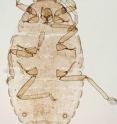A new species of gall makers in the aphid genus of plant lice was found in China
Aphid researchers from Chinese Academy of Sciences found one new species, Aleurodaphis sinojackiae Qiao & Jiang, 2011 from Jiangsu and Zhejiang Provinces, China. It forms leaf galls on Jack trees (Sinojackia xylocarpa) and is one of two known gall makers in the plant lice Aleurodaphis (Hemiptera, Aphididae, Hormaphidinae). The study was published in the open access journal ZooKeys. Aleurodaphis was established in 1917 by van der Goot and has eight known species in the world, restricted to China, Japan, India and Indonesia. Its remarkable characteristics are the followings, body of apterae is similar to nymphs of mealywing, frontal horn is absent and wax glands are arranged along crenulated margin of body.
The range of its host plants is quite wide, but only two of them can form leaf galls on the host plants, A. sinojackiae and A. stewartiae. The new species was named after its host plant, Jack trees (Sinojackia xylocarpa). It induced the leaves of host plants to curl and form leaf galls.
The most typical characteristic of the new species is that wax glands are arranged on each segment of body not connecting with each other in apterae, while arranged continuously along the edge of body as a crenulation in the other known species of the genus.
Aleurodaphis sinisalicis Zhang, 1982 was confirmed as a synonym with A. blumeae van der Goot, 1917 after checking the type specimens.
The holotype and some paratypes of the new species are deposited in British Natural History Museum, London, UK (BMNH), while the other paratypes in the National Zoological Museum of China, Institute of Zoology, Chinese Academy of Sciences, Beijing, China (NZMC) and Kôgakkan University, Japan.
Source: Pensoft Publishers
Other sources
- New species of gall makers in the aphid genus of plant lice found in Chinafrom Science DailyWed, 2 Nov 2011, 0:32:02 UTC
- A new species of gall makers in the aphid genus of plant lice was found in Chinafrom PhysorgTue, 1 Nov 2011, 13:30:31 UTC
